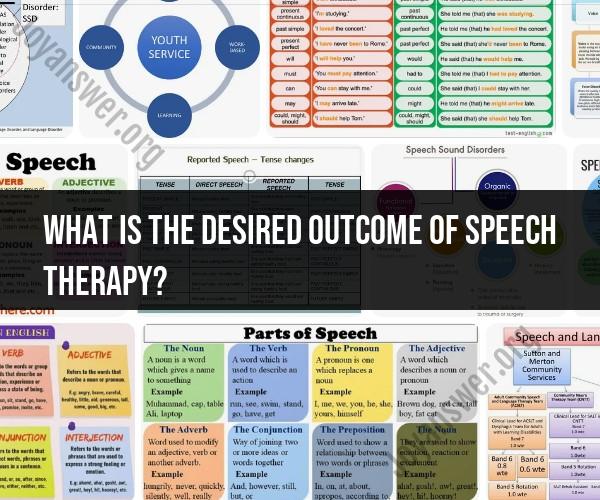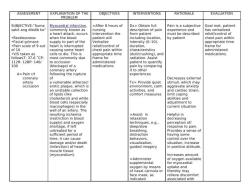What is the desired outcome of speech therapy?
The desired outcomes of speech therapy can vary depending on the individual's specific communication needs and goals. Speech therapy is a highly individualized process, and the objectives are tailored to address the person's unique challenges and circumstances. However, there are several common desired outcomes associated with speech therapy:
Improved Communication: The primary goal of speech therapy is to enhance an individual's ability to communicate effectively. This includes both expressive communication (speaking or expressing thoughts) and receptive communication (understanding and comprehending spoken language).
Increased Speech Clarity: For individuals with speech sound disorders, the goal is often to improve the clarity and articulation of speech sounds. This may involve correcting pronunciation issues and reducing speech errors.
Enhanced Language Skills: Speech therapy aims to develop and strengthen language skills, including vocabulary, grammar, syntax, semantics, and pragmatics. Improvements in these areas contribute to more effective and nuanced communication.
Fluency Improvement: In cases of stuttering or fluency disorders, the desired outcome is improved fluency, reduced stuttering frequency, and enhanced communication fluidity.
Aphasia Recovery: For individuals with aphasia (a language disorder typically resulting from brain injury), speech therapy focuses on language recovery. The goal is to help individuals regain language abilities, including speaking, understanding, reading, and writing.
Augmented Communication: In cases of severe communication impairments, the desired outcome may involve the use of augmentative and alternative communication (AAC) systems. This includes the ability to effectively use communication devices or alternative methods (e.g., sign language) to express thoughts and needs.
Swallowing and Feeding Improvement: Speech therapy can help individuals with swallowing and feeding difficulties (dysphagia) improve their ability to swallow safely and efficiently, reducing the risk of choking or aspiration.
Social Communication Skills: Speech therapy aims to enhance social communication skills, including understanding nonverbal cues, maintaining appropriate eye contact, and engaging in conversations with peers and others.
Increased Confidence: A positive outcome of speech therapy is improved self-confidence and reduced anxiety related to communication. As individuals see progress in their communication abilities, they often gain confidence in social interactions.
Functional Communication: Ultimately, the desired outcome is functional communication—being able to express needs, thoughts, and ideas effectively in various real-life situations, such as at work, school, or in social settings.
Independence and Quality of Life: Speech therapy strives to promote independence and an improved quality of life for individuals with communication disorders. This includes the ability to participate in daily activities, engage in social relationships, and access educational and employment opportunities.
Maintenance of Gains: In some cases, the goal of speech therapy may be to help individuals maintain their communication gains and prevent regression, particularly in progressive conditions or as individuals age.
It's important to note that the specific desired outcomes of speech therapy are established through a thorough evaluation by a certified speech-language pathologist (SLP). The SLP works collaboratively with the individual and their family to set realistic and achievable goals, develop a tailored therapy plan, and monitor progress over time. Success in speech therapy is often measured in terms of functional improvement and the individual's ability to participate fully in everyday life.
Speech Therapy Goals: Defining the Desired Outcomes
Speech therapy goals are the specific outcomes that a speech therapist and client are working to achieve. Speech therapy goals can be short-term or long-term, and they should be specific, measurable, achievable, relevant, and time-bound.
When defining speech therapy goals, it is important to consider the client's individual needs and abilities. The goals should be realistic and achievable, and they should be aligned with the client's overall communication goals.
Here are some examples of speech therapy goals:
- Improve articulation: The client will produce the /s/ sound at the beginning of words with 80% accuracy in 3 out of 4 consecutive sessions.
- Increase vocabulary: The client will learn and use 10 new vocabulary words per week.
- Improve grammar: The client will use correct grammar in 90% of their sentences.
- Improve fluency: The client will pause less than 3 times per minute when speaking.
- Improve voice quality: The client will produce a clear and audible voice with good volume and pitch.
A Successful Speech Journey: Achieving Desired Outcomes in Therapy
To achieve desired outcomes in speech therapy, it is important to be consistent with therapy and to practice the skills that are being taught. The client should also be actively involved in setting goals and developing a treatment plan.
Here are some tips for achieving desired outcomes in speech therapy:
- Be consistent with therapy. It is important to attend all speech therapy sessions and to practice the skills that are being taught at home.
- Be actively involved in your treatment. Ask questions and provide feedback to your speech therapist.
- Set realistic goals. Your speech therapist can help you to set goals that are achievable and aligned with your overall communication goals.
- Be patient and persistent. Speech therapy takes time and effort. It is important to be patient and persistent in order to see results.
Progress in Speech: Measuring the Desired Outcome of Therapy
Progress in speech therapy can be measured in a number of ways. One way to measure progress is to track the client's performance on specific tasks or activities. For example, the speech therapist may track the client's accuracy in producing certain sounds or the client's ability to use correct grammar in their sentences.
Another way to measure progress in speech therapy is to track the client's communication goals. For example, the speech therapist may track the client's ability to communicate effectively in different settings, such as school, work, and social situations.
It is also important to consider the client's own perception of their progress. The speech therapist can ask the client how they feel about their communication skills and how they feel about their progress in therapy.
By measuring progress in speech therapy, the speech therapist and client can ensure that they are on track to achieve their desired outcomes.













